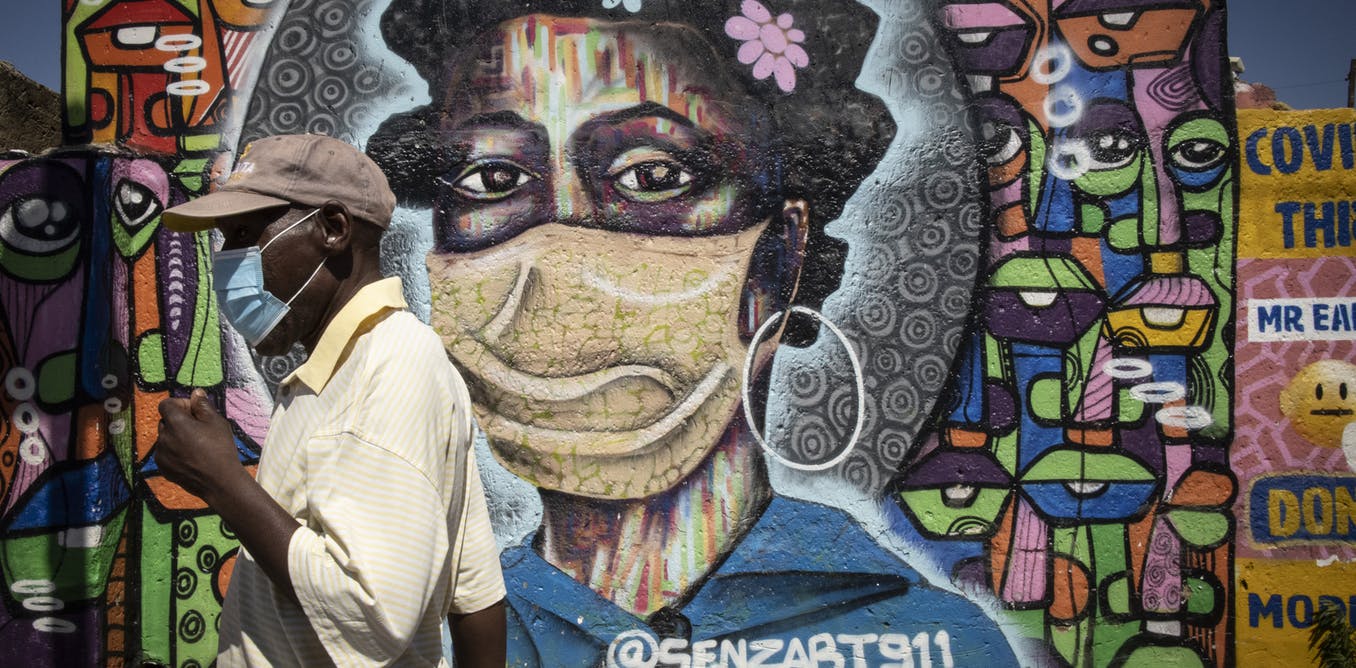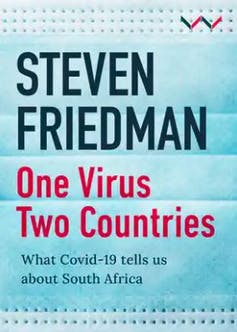One virus, two countries: how the misuse of science compounded South Africa’s COVID crisis

A Soweto resident walks past a graffiti art wall educating locals about the dangers of COVID-19 in South Africa Kim Ludbrook/EFE-EPA
Now, and in the past, “following the science” on COVID-19 has landed South Africa in trouble. This is not an indictment of science, but of the way it is understood in South Africa.
My new book One Virus, Two Countries, which examines South Africa’s response to COVID-19’s arrival in 2020, points out that South Africa fared far worse than the rest of Africa – its case and death numbers were equal to those of the rest of Africa combined. While it is commonly claimed that this is because South Africa tests more, its own scientists have acknowledged that this is not. The book argues that this happened because the minority which takes part in South African public life is fixated on Europe and North America.
Repeated claims that the country was “following the science” really meant it was following a particular science followed by some Western scientists – one which ensured high case and death rates because it meant not taking enough of the protective measures needed to prevent the virus’s spread, not only restrictions when they were needed but also testing and tracing the contacts of infected people.
Only weeks after the virus began circulating, Salim Abdool Karim, who was then in effect the government’s chief scientific advisor, declared that a “severe epidemic” was inevitable because no country had avoided one – he urged authorities to prepare for bereavements.
It soon became clear that he was expressing a consensus among South African scientists, or at least those quoted in the media.
Daily headlines showed it was not true that no country had avoided a severe epidemic. Many had done just that including South Korea, which faced rapid spread of the virus but avoided a severe outbreak, showing that it was possible to keep cases and deaths down even after the virus began spreading. Although successive waves of COVID-19 did drive up cases and deaths in these countries, they have still avoided severe epidemics: South Korea’s population is similar to South Africa’s but it has lost only around 4,000 people to COVID, less than one twenty-fifth of South Africa’s official death toll.
What the scientists said was not “the science” but “a science”, a particular view rejected by many scientists around the world.
The big divide
Medical scientists were divided between those who believed every effort should be made to fight the virus and those who argued only for managing it. The group that argued for just managing it – some of whom influenced Donald Trump and the UK government – were against restrictions.
South Africa’s publicly quoted scientists were in this last camp, which is why most denounced the lockdown. Remarkably, while scientists elsewhere hotly debated this highly contentious view, South Africa’s publicly quoted scientists all endorsed it.

The government, while differing with some scientists on lockdowns, agreed that much disease and death was inevitable. Zweli Mkhize, the then minister of health, echoing scientists, declared that 60% of the country would be touched by COVID. This was the figure cited by scientists who peddled the now discredited theory that the virus should be allowed to spread until it ran out of hosts – which was greeted with horror elsewhere because it implied that many would have to die but was a consensus view in South Africa’s debate.
The media agreed. During 2020, not one scientist was asked a single critical question although much of what they said was disputed by scientists elsewhere and some of their claims were clearly wrong.
I argue in the book that COVID-19 is among the media’s most shameful moments – it treated scientists much as media in totalitarian countries treat government leaders.
Business first supported the lockdown, then lobbied against restrictions. The media helped it – while other countries’ television channels showed pain and death in hospitals and cemeteries, South Africa’s was interested only in the loud pain of travel agents and restaurant owners.
‘First world’ bias
The scientists did not advocate surrender because they were not up on the latest debates. They did it because South Africa remains divided between “insiders” and “outsiders” and they, like the media which fawned over them and the lobbies which began mobilising against health restrictions weeks into the pandemic, see the world through “insider” lenses.
Internationally, the pandemic disturbed the view which divides the planet into first and third worlds, the first an island of competence and health in a sea of third world sickness and savagery. The countries which did least to protect people were in the first, not the third.
The planet’s divide is also South Africa’s. The minority which is heard in the national debate lives and thinks like the first world. It is fixated on Western countries whether it praises or criticises them. And it sees the rest of South Africa as a third world of poverty and incapacity.
When the scientists said no country had avoided a severe epidemic, they meant no country they noticed – no first world country. When they said South Africa was doomed to suffer, they assumed that the third world majority would be too ignorant to protect themselves – and that only first world medicine would work but that the country did not have enough of it. The rest of the first world see South Africa in the same way.
It was the biases of its first world which prevented South Africa from mobilising the energies and talents of most of its people (many of whom were far less ignorant of the virus than their first world betters) to reduce cases and deaths to levels elsewhere in Africa.
Those biases may also now ensure that most people are not vaccinated because vaccine arrangements are tailored to the first world.

Steven Friedman does not work for, consult, own shares in or receive funding from any company or organisation that would benefit from this article, and has disclosed no relevant affiliations beyond their academic appointment.






